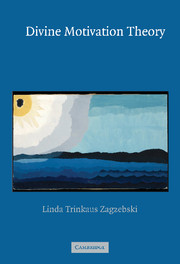Part II - Divine Motivation theory
Published online by Cambridge University Press: 02 December 2009
Summary
There have been two general approaches to the connection between God and morality in the history of Western philosophy. According to what is usually called voluntarism, God created morality by an act of his free will and imposed it upon us. For us, morality is obedience to a divine sovereign; for God, morality does not clearly apply at all. According to intellectualism, there are eternal moral truths that God did not create and that are valid for God as well as for us. God commands us, but God's commandments come from his intellect's knowledge of these truths. In both approaches, morality is law. In Part II, I will propose a third alternative. God is essential to morality, not because it comes from either his intellect or his will, but because it comes from his motives. God's motive dispositions, like ours, are components of his virtues, and all moral value derives from God's motives. There are many exemplars of goodness in ordinary life, but the ultimate paradigm of goodness and the source of value is God. The moral properties defined in Part I ultimately refer to the motives of God.
- Type
- Chapter
- Information
- Divine Motivation Theory , pp. 185 - 186Publisher: Cambridge University PressPrint publication year: 2004
- 1
- Cited by



